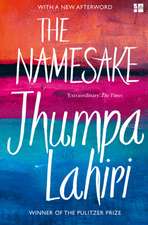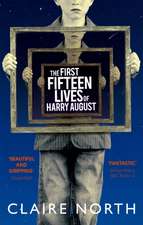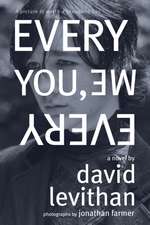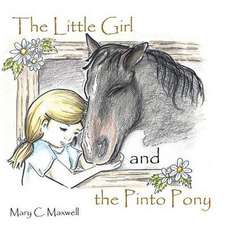Every Day
Autor David Levithanen Limba Engleză Paperback – 29 aug 2013 – vârsta de la 12 ani
| Toate formatele și edițiile | Preț | Express |
|---|---|---|
| Paperback (4) | 57.96 lei 3-5 săpt. | +11.12 lei 6-12 zile |
| HarperCollins Publishers – 29 aug 2013 | 57.96 lei 3-5 săpt. | +11.12 lei 6-12 zile |
| Ember – 9 sep 2013 | 81.04 lei 3-5 săpt. | +27.11 lei 6-12 zile |
| Klett Sprachen GmbH – 17 aug 2015 | 86.04 lei 17-24 zile | +7.99 lei 6-12 zile |
| Random House LLC US – 2 mai 2023 | 103.52 lei 3-5 săpt. | +32.06 lei 6-12 zile |
| Hardback (1) | 207.05 lei 3-5 săpt. | |
| Knopf Doubleday Publishing Group – 2 mai 2023 | 207.05 lei 3-5 săpt. |
Preț: 57.96 lei
Nou
Puncte Express: 87
Preț estimativ în valută:
11.09€ • 11.58$ • 9.18£
11.09€ • 11.58$ • 9.18£
Carte disponibilă
Livrare economică 14-28 martie
Livrare express 27 februarie-05 martie pentru 21.11 lei
Preluare comenzi: 021 569.72.76
Specificații
ISBN-13: 9781405264426
ISBN-10: 140526442X
Pagini: 373
Dimensiuni: 126 x 196 x 25 mm
Greutate: 0.27 kg
Editura: HarperCollins Publishers
Colecția Farshore
ISBN-10: 140526442X
Pagini: 373
Dimensiuni: 126 x 196 x 25 mm
Greutate: 0.27 kg
Editura: HarperCollins Publishers
Colecția Farshore
Recenzii
School Library Journal Best of Children's Books 2012
Kirkus Reviews Best of Teen's Books 2012
Booklist Best of Children's Books 2012
"Fresh, unique, funny, and achingly honest, Levithan brilliantly explores the adolescent conundrum of not feeling like oneself, and not knowing where one belongs. I didn't just read this book — I inhaled it." —Jodi Picoult, NYT bestselling author of Lone Wolf and Between the Lines
Entertainment Weekly, August 22, 2012:
"Rich in wisdom and wit...Levithan keeps the pages turning not only with ingenious twists on his central conceit but with A's hard-earned pieces of wisdom about identity, isolation, and love. Every Day has the power to teach a bully empathy by answering an essential question: What's it like to be you and not me — even if it's just for one day?"
New York Times Book Review, August 26, 2012:
"It demonstrates Levithan's talent for empathy, which is paired in the best parts of the book with a persuasive optimism about the odds for happiness and for true love."
Los Angeles Times, September 2, 2012:
"It's the rare book that challenges gender presumptions in a way that's as entertaining as it is unexpected and, perhaps most important, that's relatable to teens who may not think they need sensitivity training when it comes to sexual orientation and the nature of true love. ‘Every Day' is precisely such a book...A story that is always alluring, oftentimes humorous and much like love itself — splendorous."
MTV Hollywood Crush, September 28, 2012:
"Thoughtful and fascinating...A study in the most real and human of concerns: the importance of empathy, the value of friends and family, and the beauty of permanence that we have the luxury of taking for granted."
Boston Globe, September 15, 2012:
"Ambitious and provocative...we’re not ready to let A go."
OUT Magazine, December 2012:
"One of the most inventive young adult novels of the year."
Romantic Times, October 2012:
"Levithan is a literary genius. His style of writing is brilliant — practically flawless... Reading A’s journey to make love last, in a world that is always changing, is an experience I hope everyone gets to share."
Starred Review, School Library Journal, September 2012:
"Every step of the narrative feels real and will elicit a strong emotional response from readers and offer them plenty of fodder for speculation, especially regarding the nature of love.”
Starred Review, Booklist, July 1, 2012:
“Levithan has created an irresistible premise that is sure to captivate readers….
[Every Day] is a study in style, an exercise in imagination, and an opportunity for readers themselves to occupy another life: that of A, himself.”
Starred Review, Kirkus Reviews, May 15, 2012:
“An awe-inspiring, thought-provoking reminder that love reaches beyond physical appearances or gender.”
Starred Review, Shelf Awareness, September 7, 2012:
"Levithan's unusual love story will make teens think about how the core of the soul never changes. A speaks of faith, love, dreams and death with a wisdom derived from thousands of lives visited over 16 years and firsthand proof of how much humans share rather than what sets them apart."
The Bulletin of the Center for Children's Books, September 2012:
"This unconventional romance considers some fascinating and unexpected questions about the nature of identity, consciousness, love, and gender...Readers will identify with A’s profound longing for connection, but they’ll also be intrigued by the butterfly effect A’s presence may have on numerous other teens who make brief but memorable appearances."
The Horn Book, November 2012:
"Brilliantly conceived...[Levithan] shapes the narrative into a profound exploration of what it means to love someone."
Letter Blocks, the BN Parents & Educators blog, August 23, 2012:
"A definite crowd-pleaser."
The L Magazine, August 29, 2012:
"The premise allows for stimulating parallels: A’s experience is both like the writer’s, who inhabits the consciousnesses of random characters, and the adolescent’s, who tries on myriad identities."
Kirkus Reviews Best of Teen's Books 2012
Booklist Best of Children's Books 2012
"Fresh, unique, funny, and achingly honest, Levithan brilliantly explores the adolescent conundrum of not feeling like oneself, and not knowing where one belongs. I didn't just read this book — I inhaled it." —Jodi Picoult, NYT bestselling author of Lone Wolf and Between the Lines
Entertainment Weekly, August 22, 2012:
"Rich in wisdom and wit...Levithan keeps the pages turning not only with ingenious twists on his central conceit but with A's hard-earned pieces of wisdom about identity, isolation, and love. Every Day has the power to teach a bully empathy by answering an essential question: What's it like to be you and not me — even if it's just for one day?"
New York Times Book Review, August 26, 2012:
"It demonstrates Levithan's talent for empathy, which is paired in the best parts of the book with a persuasive optimism about the odds for happiness and for true love."
Los Angeles Times, September 2, 2012:
"It's the rare book that challenges gender presumptions in a way that's as entertaining as it is unexpected and, perhaps most important, that's relatable to teens who may not think they need sensitivity training when it comes to sexual orientation and the nature of true love. ‘Every Day' is precisely such a book...A story that is always alluring, oftentimes humorous and much like love itself — splendorous."
MTV Hollywood Crush, September 28, 2012:
"Thoughtful and fascinating...A study in the most real and human of concerns: the importance of empathy, the value of friends and family, and the beauty of permanence that we have the luxury of taking for granted."
Boston Globe, September 15, 2012:
"Ambitious and provocative...we’re not ready to let A go."
OUT Magazine, December 2012:
"One of the most inventive young adult novels of the year."
Romantic Times, October 2012:
"Levithan is a literary genius. His style of writing is brilliant — practically flawless... Reading A’s journey to make love last, in a world that is always changing, is an experience I hope everyone gets to share."
Starred Review, School Library Journal, September 2012:
"Every step of the narrative feels real and will elicit a strong emotional response from readers and offer them plenty of fodder for speculation, especially regarding the nature of love.”
Starred Review, Booklist, July 1, 2012:
“Levithan has created an irresistible premise that is sure to captivate readers….
[Every Day] is a study in style, an exercise in imagination, and an opportunity for readers themselves to occupy another life: that of A, himself.”
Starred Review, Kirkus Reviews, May 15, 2012:
“An awe-inspiring, thought-provoking reminder that love reaches beyond physical appearances or gender.”
Starred Review, Shelf Awareness, September 7, 2012:
"Levithan's unusual love story will make teens think about how the core of the soul never changes. A speaks of faith, love, dreams and death with a wisdom derived from thousands of lives visited over 16 years and firsthand proof of how much humans share rather than what sets them apart."
The Bulletin of the Center for Children's Books, September 2012:
"This unconventional romance considers some fascinating and unexpected questions about the nature of identity, consciousness, love, and gender...Readers will identify with A’s profound longing for connection, but they’ll also be intrigued by the butterfly effect A’s presence may have on numerous other teens who make brief but memorable appearances."
The Horn Book, November 2012:
"Brilliantly conceived...[Levithan] shapes the narrative into a profound exploration of what it means to love someone."
Letter Blocks, the BN Parents & Educators blog, August 23, 2012:
"A definite crowd-pleaser."
The L Magazine, August 29, 2012:
"The premise allows for stimulating parallels: A’s experience is both like the writer’s, who inhabits the consciousnesses of random characters, and the adolescent’s, who tries on myriad identities."
Notă biografică
DAVID LEVITHAN is a children's book editor in New York City, and the author of several books for young adults, including Nick & Norah's Infinite Playlist and Dash & Lily's Book of Dares (co-authored with Rachel Cohn); Will Grayson, Will Grayson (co-authored with John Green); and Every You, Every Me (with photographs from Jonathan Farmer). He lives in Hoboken, New Jersey.
Extras
Day 5994
I wake up.
Immediately I have to figure out who I am. It’s not just the body--opening my eyes and discovering whether the skin on my arm is light or dark, whether my hair is long or short, whether I’m fat or thin, boy or girl, scarred or smooth. The body is the easiest thing to adjust to, if you’re used to waking up in a new one each morning. It’s the life, the context of the body, that can be hard to grasp.
Every day I am someone else. I am myself--I know I am myself--but I am also someone else.
It has always been like this.
The information is there. I wake up, open my eyes, understand that it is a new morning, a new place. The biography kicks in, a welcome gift from the not‑me part of the mind. Today I am Justin. Somehow I know this--my name is Justin--and at the same time I know that I’m not really Justin, I’m only borrowing his life for a day. I look around and know that this is his room. This is his home. The alarm will go off in seven minutes.
I’m never the same person twice, but I’ve certainly been this type before. Clothes everywhere. Far more video games than books. Sleeps in his boxers. From the taste of his mouth, a smoker. But not so addicted that he needs one as soon as he wakes up.
“Good morning, Justin,” I say. Checking out his voice. Low. The voice in my head is always different.
Justin doesn’t take care of himself. His scalp itches. His eyes don’t want to open. He hasn’t gotten much sleep.
Already I know I’m not going to like today.
It’s hard being in the body of someone you don’t like, because you still have to respect it. I’ve harmed people’s lives in the past, and I’ve found that every time I slip up, it haunts me. So I try to be careful.
From what I can tell, every person I inhabit is the same age as me. I don’t hop from being sixteen to being sixty. Right now, it’s only sixteen. I don’t know how this works. Or why. I stopped trying to figure it out a long time ago. I’m never going to figure it out, any more than a normal person will figure out his or her own existence. After a while, you have to be at peace with the fact that you simply are. There is no way to know why. You can have theories, but there will never be proof.
I can access facts, not feelings. I know this is Justin’s room, but I have no idea if he likes it or not. Does he want to kill his parents in the next room? Or would he be lost without his mother coming in to make sure he’s awake? It’s impossible to tell. It’s as if that part of me replaces the same part of whatever person I’m in. And while I’m glad to be thinking like myself, a hint every now and then of how the other person thinks would be helpful. We all contain mysteries, especially when seen from the inside.
The alarm goes off. I reach for a shirt and some jeans, but something lets me see that it’s the same shirt he wore yesterday. I pick a different shirt. I take the clothes with me to the bathroom, dress after showering. His parents are in the kitchen now. They have no idea that anything is different.
Sixteen years is a lot of time to practice. I don’t usually make mistakes. Not anymore.
I read his parents easily: Justin doesn’t talk to them much in the morning, so I don’t have to talk to them. I have grown accustomed to sensing expectation in others, or the lack of it. I shovel down some cereal, leave the bowl in the sink without washing it, grab Justin’s keys and go.
Yesterday I was a girl in a town I’d guess to be two hours away. The day before, I was a boy in a town three hours farther than that. I am already forgetting their details. I have to, or else I will never remember who I really am.
Justin listens to loud and obnoxious music on a loud and obnoxious station where loud and obnoxious DJs make loud and obnoxious jokes as a way of getting through the morning. This is all I need to know about Justin, really. I access his memory to show me the way to school, which parking space to take, which locker to go to. The combination. The names of the people he knows in the halls.
Sometimes I can’t go through these motions. I can’t bring myself to go to school, maneuver through the day. I’ll say I’m sick, stay in bed and read a few books. But even that gets tiresome after a while, and I find myself up for the challenge of a new school, new friends. For a day.
As I take Justin’s books out of his locker, I can feel someone hovering on the periphery. I turn, and the girl standing there is transparent in her emotions--tentative and expectant, nervous and adoring. I don’t have to access Justin to know that this is his girlfriend. No one else would have this reaction to him, so unsteady in his presence. She’s pretty, but she doesn’t see it. She’s hiding behind her hair, happy to see me and unhappy to see me at the same time.
Her name is Rhiannon. And for a moment--just the slightest beat--I think that, yes, this is the right name for her. I don’t know why. I don’t know her. But it feels right.
This is not Justin’s thought. It’s mine. I try to ignore it. I’m not the person she wants to talk to.
“Hey,” I say, keeping it casual.
“Hey,” she murmurs back.
She’s looking at the floor, at her inked‑in Converse. She’s drawn cities there, skylines around the soles. Something’s happened between her and Justin, and I don’t know what it is. It’s probably not something that Justin even recognized at the time.
“Are you okay?” I ask.
I see the surprise on her face, even as she tries to cover it. This is not something that Justin normally asks.
And the strange thing is: I want to know the answer. The fact that he wouldn’t care makes me want it more.
“Sure,” she says, not sounding sure at all.
I find it hard to look at her. I know from experience that beneath every peripheral girl is a central truth. She’s hiding hers away, but at the same time she wants me to see it. That is, she wants Justin to see it. And it’s there, just out of my reach. A sound waiting to be a word.
She is so lost in her sadness that she has no idea how visible it is. I think I understand her--for a moment, I presume to understand her--but then, from within this sadness, she surprises me with a brief flash of determination. Bravery, even.
Shifting her gaze away from the floor, her eyes matching mine, she asks, “Are you mad at me?”
I can’t think of any reason to be mad at her. If anything, I am mad at Justin, for making her feel so diminished. It’s there in her body language. When she is around him, she makes herself small.
“No,” I say. “I’m not mad at you at all.”
I tell her what she wants to hear, but she doesn’t trust it. I feed her the right words, but she suspects they’re threaded with hooks.
This is not my problem; I know that. I am here for one day. I cannot solve anyone’s boyfriend problems. I should not change anyone’s life.
I turn away from her, get my books out, close the locker. She stays in the same spot, anchored by the profound, desperate loneliness of a bad relationship.
“Do you still want to get lunch today?” she asks.
The easy thing would be to say no. I often do this: sense the other person’s life drawing me in, and run in the other direction.
But there’s something about her--the cities on her shoes, the flash of bravery, the unnecessary sadness--that makes me want to know what the word will be when it stops being a sound. I have spent years meeting people without ever knowing them, and on this morning, in this place, with this girl, I feel the faintest pull of wanting to know. And in a moment of either weakness or bravery on my own part, I decide to follow it. I decide to find out more.
“Absolutely,” I say. “Lunch would be great.”
Again, I read her: What I’ve said is too enthusiastic. Justin is never enthusiastic.
“No big deal,” I add.
She’s relieved. Or, at least, as relieved as she’ll allow herself to be, which is a very guarded form of relief. By accessing, I know she and Justin have been together for over a year. That’s as specific as it gets. Justin doesn’t remember the exact date.
She reaches out and takes my hand. I am surprised by how good this feels.
“I’m glad you’re not mad at me,” she says. “I just want everything to be okay.”
I nod. If there’s one thing I’ve learned, it’s this: We all want everything to be okay. We don’t even wish so much for fantastic or marvelous or outstanding. We will happily settle for okay, because most of the time, okay is enough.
The first bell rings.
“I’ll see you later,” I say.
Such a basic promise. But to Rhiannon, it means the world.
I wake up.
Immediately I have to figure out who I am. It’s not just the body--opening my eyes and discovering whether the skin on my arm is light or dark, whether my hair is long or short, whether I’m fat or thin, boy or girl, scarred or smooth. The body is the easiest thing to adjust to, if you’re used to waking up in a new one each morning. It’s the life, the context of the body, that can be hard to grasp.
Every day I am someone else. I am myself--I know I am myself--but I am also someone else.
It has always been like this.
The information is there. I wake up, open my eyes, understand that it is a new morning, a new place. The biography kicks in, a welcome gift from the not‑me part of the mind. Today I am Justin. Somehow I know this--my name is Justin--and at the same time I know that I’m not really Justin, I’m only borrowing his life for a day. I look around and know that this is his room. This is his home. The alarm will go off in seven minutes.
I’m never the same person twice, but I’ve certainly been this type before. Clothes everywhere. Far more video games than books. Sleeps in his boxers. From the taste of his mouth, a smoker. But not so addicted that he needs one as soon as he wakes up.
“Good morning, Justin,” I say. Checking out his voice. Low. The voice in my head is always different.
Justin doesn’t take care of himself. His scalp itches. His eyes don’t want to open. He hasn’t gotten much sleep.
Already I know I’m not going to like today.
It’s hard being in the body of someone you don’t like, because you still have to respect it. I’ve harmed people’s lives in the past, and I’ve found that every time I slip up, it haunts me. So I try to be careful.
From what I can tell, every person I inhabit is the same age as me. I don’t hop from being sixteen to being sixty. Right now, it’s only sixteen. I don’t know how this works. Or why. I stopped trying to figure it out a long time ago. I’m never going to figure it out, any more than a normal person will figure out his or her own existence. After a while, you have to be at peace with the fact that you simply are. There is no way to know why. You can have theories, but there will never be proof.
I can access facts, not feelings. I know this is Justin’s room, but I have no idea if he likes it or not. Does he want to kill his parents in the next room? Or would he be lost without his mother coming in to make sure he’s awake? It’s impossible to tell. It’s as if that part of me replaces the same part of whatever person I’m in. And while I’m glad to be thinking like myself, a hint every now and then of how the other person thinks would be helpful. We all contain mysteries, especially when seen from the inside.
The alarm goes off. I reach for a shirt and some jeans, but something lets me see that it’s the same shirt he wore yesterday. I pick a different shirt. I take the clothes with me to the bathroom, dress after showering. His parents are in the kitchen now. They have no idea that anything is different.
Sixteen years is a lot of time to practice. I don’t usually make mistakes. Not anymore.
I read his parents easily: Justin doesn’t talk to them much in the morning, so I don’t have to talk to them. I have grown accustomed to sensing expectation in others, or the lack of it. I shovel down some cereal, leave the bowl in the sink without washing it, grab Justin’s keys and go.
Yesterday I was a girl in a town I’d guess to be two hours away. The day before, I was a boy in a town three hours farther than that. I am already forgetting their details. I have to, or else I will never remember who I really am.
Justin listens to loud and obnoxious music on a loud and obnoxious station where loud and obnoxious DJs make loud and obnoxious jokes as a way of getting through the morning. This is all I need to know about Justin, really. I access his memory to show me the way to school, which parking space to take, which locker to go to. The combination. The names of the people he knows in the halls.
Sometimes I can’t go through these motions. I can’t bring myself to go to school, maneuver through the day. I’ll say I’m sick, stay in bed and read a few books. But even that gets tiresome after a while, and I find myself up for the challenge of a new school, new friends. For a day.
As I take Justin’s books out of his locker, I can feel someone hovering on the periphery. I turn, and the girl standing there is transparent in her emotions--tentative and expectant, nervous and adoring. I don’t have to access Justin to know that this is his girlfriend. No one else would have this reaction to him, so unsteady in his presence. She’s pretty, but she doesn’t see it. She’s hiding behind her hair, happy to see me and unhappy to see me at the same time.
Her name is Rhiannon. And for a moment--just the slightest beat--I think that, yes, this is the right name for her. I don’t know why. I don’t know her. But it feels right.
This is not Justin’s thought. It’s mine. I try to ignore it. I’m not the person she wants to talk to.
“Hey,” I say, keeping it casual.
“Hey,” she murmurs back.
She’s looking at the floor, at her inked‑in Converse. She’s drawn cities there, skylines around the soles. Something’s happened between her and Justin, and I don’t know what it is. It’s probably not something that Justin even recognized at the time.
“Are you okay?” I ask.
I see the surprise on her face, even as she tries to cover it. This is not something that Justin normally asks.
And the strange thing is: I want to know the answer. The fact that he wouldn’t care makes me want it more.
“Sure,” she says, not sounding sure at all.
I find it hard to look at her. I know from experience that beneath every peripheral girl is a central truth. She’s hiding hers away, but at the same time she wants me to see it. That is, she wants Justin to see it. And it’s there, just out of my reach. A sound waiting to be a word.
She is so lost in her sadness that she has no idea how visible it is. I think I understand her--for a moment, I presume to understand her--but then, from within this sadness, she surprises me with a brief flash of determination. Bravery, even.
Shifting her gaze away from the floor, her eyes matching mine, she asks, “Are you mad at me?”
I can’t think of any reason to be mad at her. If anything, I am mad at Justin, for making her feel so diminished. It’s there in her body language. When she is around him, she makes herself small.
“No,” I say. “I’m not mad at you at all.”
I tell her what she wants to hear, but she doesn’t trust it. I feed her the right words, but she suspects they’re threaded with hooks.
This is not my problem; I know that. I am here for one day. I cannot solve anyone’s boyfriend problems. I should not change anyone’s life.
I turn away from her, get my books out, close the locker. She stays in the same spot, anchored by the profound, desperate loneliness of a bad relationship.
“Do you still want to get lunch today?” she asks.
The easy thing would be to say no. I often do this: sense the other person’s life drawing me in, and run in the other direction.
But there’s something about her--the cities on her shoes, the flash of bravery, the unnecessary sadness--that makes me want to know what the word will be when it stops being a sound. I have spent years meeting people without ever knowing them, and on this morning, in this place, with this girl, I feel the faintest pull of wanting to know. And in a moment of either weakness or bravery on my own part, I decide to follow it. I decide to find out more.
“Absolutely,” I say. “Lunch would be great.”
Again, I read her: What I’ve said is too enthusiastic. Justin is never enthusiastic.
“No big deal,” I add.
She’s relieved. Or, at least, as relieved as she’ll allow herself to be, which is a very guarded form of relief. By accessing, I know she and Justin have been together for over a year. That’s as specific as it gets. Justin doesn’t remember the exact date.
She reaches out and takes my hand. I am surprised by how good this feels.
“I’m glad you’re not mad at me,” she says. “I just want everything to be okay.”
I nod. If there’s one thing I’ve learned, it’s this: We all want everything to be okay. We don’t even wish so much for fantastic or marvelous or outstanding. We will happily settle for okay, because most of the time, okay is enough.
The first bell rings.
“I’ll see you later,” I say.
Such a basic promise. But to Rhiannon, it means the world.























